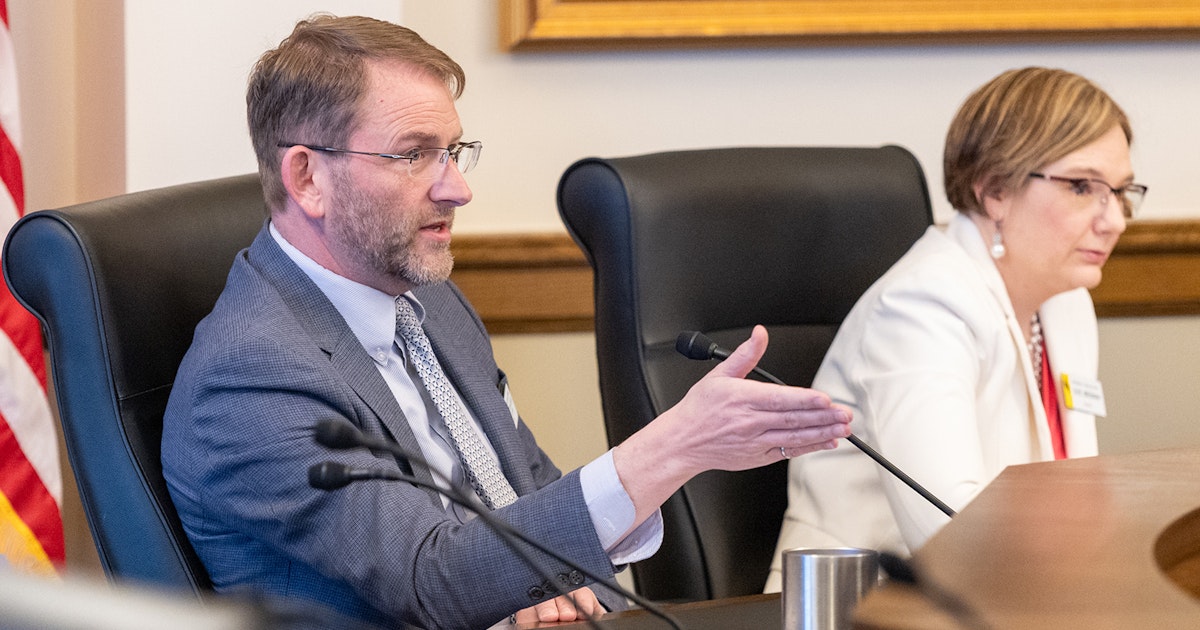
A Wyoming bill aimed to keep people from tricking the public with falsified, artificial-intelligence videos died in committee Monday when no lawmakers would second a motion to consider a vote on it.
Senate File 51 was meant to target synthetic media, or “deepfakes” that look real, by making people flag them. It would have allowed anyone depicted in or misled by such a creation to sue the social media platform or other disseminator for money, and it would have let prosecutors criminally charge people caught using deepfakes to sway elections.
The example Sen. Chris Rothfuss, D-Laramie, used in a Monday meeting of the House Corporations, Elections and Political Subdivisions Committee was: someone could flood an artificial-intelligence generator with videos of him delivering speeches on the Senate floor and create a realistic-looking deepfake video of him withdrawing from a campaign — the night before the election.
The creator would still be allowed to make and disseminate that video under Senate File 51, but he or she would have had to stamp a disclaimer letting everyone know it was a fake.
No one could have gotten sued for sending out a video of Rothfuss transformed into a donkey, he said, because that’s not something by which a reasonable person would be misled.
This bill proposed to go further than elections, as it also contained civil remedies for other deepfake scenarios not involving electioneering. That made it unique, since the other four states that have adopted legislation curbing synthetic media have focused their laws on elections, Rothfuss said.
In either scenario, he added, it would only have targeted people who knew they were spreading a lie.
“I want to emphasize this and underline it about 17 times,” said Rothfuss. The bill says “‘Knowingly and intentionally disseminates synthetic media, knowing it to be synthetic media.’”
Meaning, the new language would not have penalized people distributing fabricated videos accidentally, had it become law.
Carveouts
The bill also contained multiple carveouts. It would not have penalized internet service providers or search engines.
A lobbyist for Verizon brought an amendment to exempt telecommunications providers as well.
“Bona fide” broadcasts wouldn’t be penalized under the bill, if they put a disclaimer on questionable material saying the material’s authenticity is in doubt.
One final carveout said it protected “any synthetic media protected under the First Amendment.”
The Critics
Numerous detractors opposed the bill.
Google sent Wyoming-based lobbyist Travis McNiven to speak against the bill.
“It is quite broad and a lot of questions relate to just how and when the court actions, the legal processes would take place,” said McNiven. “That is a bit of a magnet for litigation.”
McNiven emphasized that the other four states enacting this legislation were only focused on electioneering.
“This bill, of course, contemplates the full universe of possibilities, which is a fairly large undertaking,” he said.
Rothfuss said the committee he co-chairs, the Select Committee on Blockchain, Financial Technology and Digital Innovation, chose to keep social media platforms liable under the bill because the creators of deepfakes can be impossible to find and ultimately it’s the platforms that profit from disseminating those deepfakes.
McNiven said keeping platforms liable put them in the position of moderating content, “calling balls and strikes in determining (what’s real).”
‘Stand With Twisted Sister’
Tyler Lindholm, former state Representative and now state director for Americans for Prosperity, also opposed the bill, saying it limits expression. He quoted Dee Snider, of rock band Twisted Sister, who testified in front of the U.S. Senate in 1985 about putting parental advisories on music albums.
“If they can’t manipulate you overtly through the passing of laws… they’ll do it without your knowing. It’s being done to you,” said Lindholm, quoting Snider.
Lindholm said the bill would have a “deep chilling effect” on expression in Wyoming.
“I hope you’ll stand with Twisted Sister today and vote no on this legislation,” he added.
And Ruthie Barko, of Technet, said the bill would stifle the growth of the innovation economy and limit the benefits of artificial intelligence.
She said it should have an exemption for the platform and just focus on elections.
During his own speech, Rothfuss said the Blockchain Committee looked past elections so that legislators wouldn’t just be protecting themselves, but everyone from being “destroyed” with false media.
A Silent Death
Rep. Forrest Chadwick, R-Evansville, moved the bill for consideration by the committee.
Nobody seconded that movement and the bill died.
Clair McFarland can be reached at [email protected].
